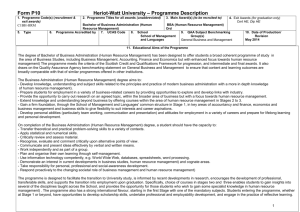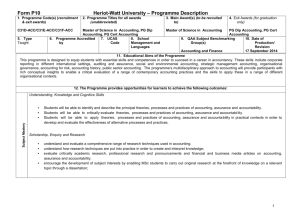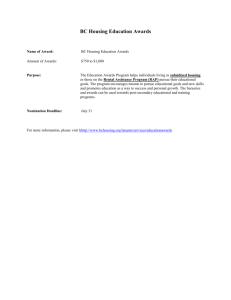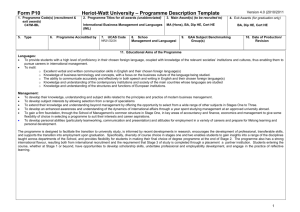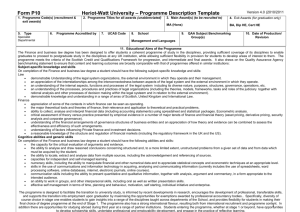Description - Heriot
advertisement
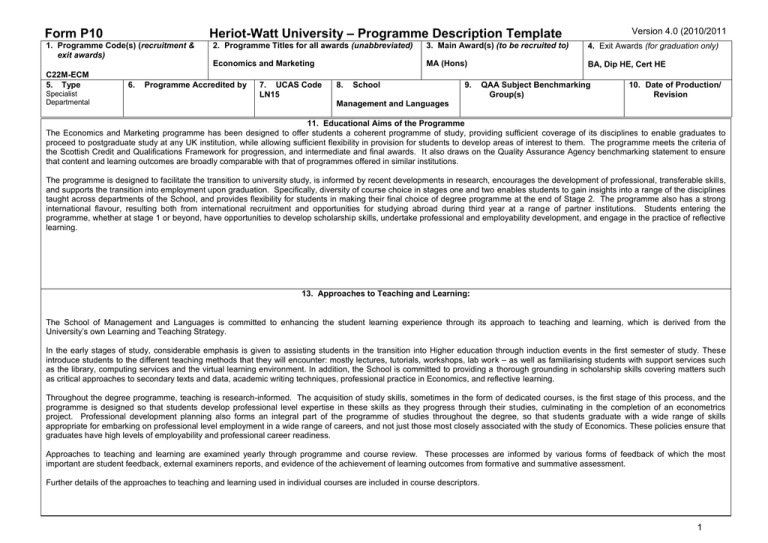
Heriot-Watt University – Programme Description Template Form P10 1. Programme Code(s) (recruitment & exit awards) C22M-ECM 5. Type Specialist Departmental 6. Version 4.0 (2010/2011 2. Programme Titles for all awards (unabbreviated) 3. Main Award(s) (to be recruited to) 4. Exit Awards (for graduation only) Economics and Marketing MA (Hons) BA, Dip HE, Cert HE Programme Accredited by 7. UCAS Code LN15 8. School 9. QAA Subject Benchmarking Group(s) 10. Date of Production/ Revision Management and Languages 11. Educational Aims of the Programme The Economics and Marketing programme has been designed to offer students a coherent programme of study, providing sufficient coverage of its disciplines to enable graduates to proceed to postgraduate study at any UK institution, while allowing sufficient flexibility in provision for students to develop areas of interest to them. The programme meets the criteria of the Scottish Credit and Qualifications Framework for progression, and intermediate and final awards. It also draws on the Quality Assurance Agency benchmarking statement to ensure that content and learning outcomes are broadly comparable with that of programmes offered in similar institutions. The programme is designed to facilitate the transition to university study, is informed by recent developments in research, encourages the development of professional, transferable skills, and supports the transition into employment upon graduation. Specifically, diversity of course choice in stages one and two enables students to gain insights into a range of the disciplines taught across departments of the School, and provides flexibility for students in making their final choice of degree programme at the end of Stage 2. The programme also has a strong international flavour, resulting both from international recruitment and opportunities for studying abroad during third year at a range of partner institutions. Students entering the programme, whether at stage 1 or beyond, have opportunities to develop scholarship skills, undertake professional and employability development, and engage in the practice of reflective learning. 13. Approaches to Teaching and Learning: The School of Management and Languages is committed to enhancing the student learning experience through its approach to teaching and learning, which is derived from the University’s own Learning and Teaching Strategy. In the early stages of study, considerable emphasis is given to assisting students in the transition into Higher education through induction events in the first semester of study. These introduce students to the different teaching methods that they will encounter: mostly lectures, tutorials, workshops, lab work – as well as familiarising students with support services such as the library, computing services and the virtual learning environment. In addition, the School is committed to providing a thorough grounding in scholarship skills covering matters such as critical approaches to secondary texts and data, academic writing techniques, professional practice in Economics, and reflective learning. Throughout the degree programme, teaching is research-informed. The acquisition of study skills, sometimes in the form of dedicated courses, is the first stage of this process, and the programme is designed so that students develop professional level expertise in these skills as they progress through their studies, culminating in the completion of an econometrics project. Professional development planning also forms an integral part of the programme of studies throughout the degree, so that students graduate with a wide range of skills appropriate for embarking on professional level employment in a wide range of careers, and not just those most closely associated with the study of Economics. These policies ensure that graduates have high levels of employability and professional career readiness. Approaches to teaching and learning are examined yearly through programme and course review. These processes are informed by various forms of feedback of which the most important are student feedback, external examiners reports, and evidence of the achievement of learning outcomes from formative and summative assessment. Further details of the approaches to teaching and learning used in individual courses are included in course descriptors. 1 Heriot-Watt University – Programme Description Template Form P10 1. Programme Code(s) (recruitment & exit awards) C22M-ECM 5. Type Specialist Departmental 6. Version 4.0 (2010/2011 2. Programme Titles for all awards (unabbreviated) 3. Main Award(s) (to be recruited to) 4. Exit Awards (for graduation only) Economics and Marketing MA (Hons) BA, Dip HE, Cert HE Programme Accredited by 7. UCAS Code LN15 8. School 9. QAA Subject Benchmarking Group(s) 10. Date of Production/ Revision Management and Languages 14. Assessment Policies: The programme uses a range of assessment types at all stages of study. Formative assessment is used in many courses to provide students and staff with feedback on performance and the achievement of learning outcomes. This feedback is used both to inform programme development, but also to enable the adaptation of learning opportunities to meet the needs of individual students and the cohort of learners. Summative assessment for most courses will involve a combination of coursework and examinations, with greater weight typically given to unseen examination rather than coursework. The format of all assessment is determined by its appropriateness for measuring the learning outcomes of courses. Among the forms of assessment used in the programme are essays, multiple-choice question tests, written exams, presentations, group and individual projects and the econometrics project. Further details of the approaches to teaching and learning used in individual courses are included in course descriptors. The accompanying Programme Structure template provides details of courses, awards and credits for the programme. The accompanying Programme Notes provide details of stage notes, progression requirements and award requirements for the programme. 2
